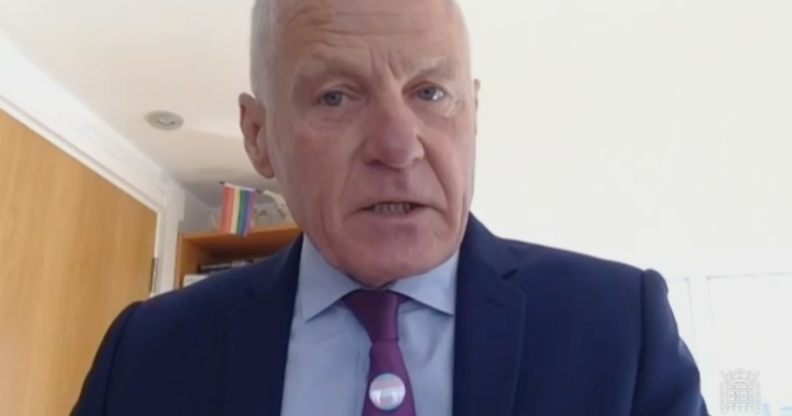Michael Cashman asked the government to explain where in the world cis men have abused self-ID to hurt women. They couldn’t

Michael Cashman. (Screen capture via Parliament Live)
Michael Cashman posed a simple question to a Tory government minister: When has a cisgender man ever self-identified as a woman to commit crimes?
The response? Silence.
Conservative peer Elizabeth Berridge, a junior minister for women, fielded questions from the House of Lords Friday morning (September 25), regarding her boss Liz Truss’ decision to abandon reforms to the Gender Recognition Act.
Among them was Stonewall co-founder Cashman, a non-affiliated peer. He grilled Berridge on the government’s “woefully inadequate” response to a public consultation which revealed strong public support for trans people’s right to self-identification.
Appearing via video uplink, Cashman said Truss’ response “fails to take into account the Government’s own consultation”.
“This is at a time when gross defamation and gross misrepresentation on trans people, particularly trans women, has been whipped up by the media and by some members of your lordship’s house,” he continued, an LGBT+ Pride flag hanging behind him and a trans Pride pin adorning his tie.
Cashman asked Berridge to explain “how the government will address the real needs of trans people, as indicated overwhelmingly in the consultation”.
He further asked her to clarify Truss’ statement, “when the secretary of state said: ‘Self-declaration would be abused by men.'”
The barbed whataboutery of a cisgender man self-identifying as a woman to commit acts of violence is frequently wielded like a club by anti-trans campaigners without evidence.
Cashman continued: “What evidence of widespread abuse does the secretary of state have from other jurisdictions that have moved to self-ID, or does the secretary of state believe British men are uniquely abusive?”
A stuttering Berridge returned to the despatch box, saying the government believes self-identification needs “formality”. Cashman burrowed his brow as she added: “We do not believe we need to move away from the current system.”
Despite Cashman ending his comments with a clear and concise question, Berridge failed to respond with what “evidence”, if any, there is of “abuse” of self-ID.
She instead peeled off commitments by the government, such as the lord commissioners being alerted to the spikes in transphobic hate crimes, as well as the appointment of Dr Michael Brady to advise “NHS England and others about healthcare for LGBT people.”

Liz Truss, Secretary of State for International Trade leaves 10 Downing Street on February 13, 2020 in London, England. (Leon Neal/Getty)
Tory Government once again confirm there will be no reforms to the 2010 Equality Act.
Cashman’s comments were also amplified by Labour peer Ray Collins, who called the government’s decision to ditch GRA reform “simply wrong”.
Elsewhere the Liberal Democrat’s Elizabeth Barker slammed Truss’ repeated claim in parliament Thursday (September 24) that her announcements – which amount to digitising the GRA process, removing the £140 fee, and a vague commitment to three new gender clinics which appear to be previously announced pilot schemes – amount to a kindness.
“The digitisation of a system which dehumanises our fellow citizens isn’t ‘kindness’, it’s callous and it’s cynical – as the repeated use of the phrase ‘trans people and women’ shows,” said Barker.
Berridge reaffirmed Truss’ announcement that there will be no changes to the Equality Act, which allows trans folk to self-identify in many arenas, such as single-sex spaces and facilities.
Despite the Equality Act being law for more than a decade, GRA reform became a proxy for anti-trans groups and lawmakers to twist the “debate” over trans rights as a siren call for the future of women’s rights.
The Tories were very clear when they set out plans for GRA reform in 2018 that they were “not proposing any amendments to the Equality Act 2010“.
This was echoed by Berridge, who said: “One thing that is clear from the response of the consultation is that there is not going to be a need for legislative action.”

